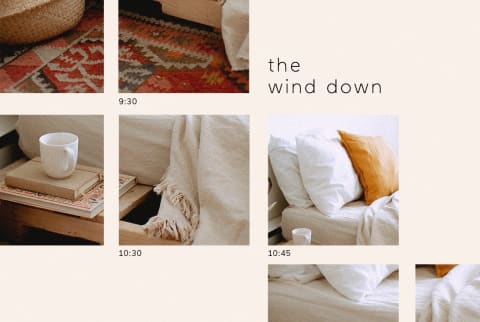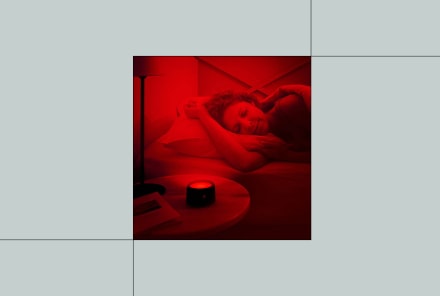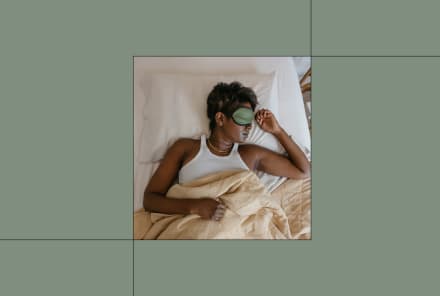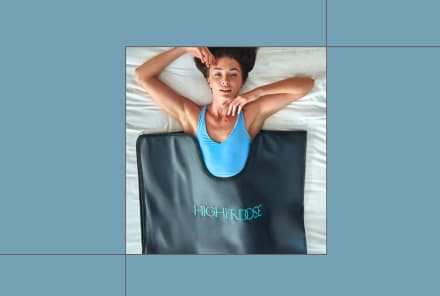Advertisement
How A Holistic Psychiatrist Falls Asleep (And Back Asleep) Each Night


I am not naturally a "good sleeper," and I would consider myself to be a night owl. I have no problem staying up late, but I have all the trouble waking up early.
It took me a long time to realize that what I thought was an inherent trait—being a late-night chronotype—was actually light sensitivity. That is, I'm particularly sensitive to light. If I see light in the evening, it suppresses my melatonin, and I can feel wide-awake for hours. If I get the proper light cues in the evening (i.e., darkness after sunset rather than the psychedelic light show of modern life), I can get sleepy at an appropriate time. So I have learned to pay a lot of attention to the role that light plays in regulating my circadian rhythm. I make a point of getting actual sunshine into my actual eyeballs as early in the morning as possible, and I wear blue-blocking glasses from sunset until bedtime to block out blue-spectrum light that would otherwise suppress my melatonin and disrupt my circadian rhythm.
I have learned to prioritize sleep because I've realized it is the second-best medicine available to us as humans (first place going to community). Sleep is free; it feels good; and it helps us with cognition, creativity, memory, attention, resourceful thinking, mental well-being, patience, longevity, brain health, and every bodily function imaginable. Yet so many of us struggle with it. I believe the body wants to sleep, and the body knows how to sleep, and sleep eludes us because of subtle aspects of modern life that jack up our circadian rhythms. So the task at hand is to make a few strategic shifts to protect these rhythms.
I prioritize this because I want to be the best doctor I can be for my patients and the best mother I can be for my daughter—and because good sleep gives me the clarity and energy to carry out my contribution to changing the conversation about mental health.

- Average hours I sleep a night: 7 to 9
- Ideal bedtime: 10:45 p.m. (I generally try to aim for ~3 hours after sunset)
- Ideal wake-up time: ~7 a.m.
- Nightstand essentials: Salt lamp, white noise machine, book, water
- Favorite place I've ever slept: In a tented cabin while "glamping" in Moab, Utah
- Sleep bad habit: I will always prioritize hanging with friends late into the evening over a wholesome early bedtime
- Caffeine consumption: I'm in a multi-decade on-again-off-again love affair with coffee and kombucha, but I'm currently caffeine-free (we'll see how long that lasts)
- How I track my sleep: I am conspicuously wearable-free. I prefer to check in with my body to see how I feel in the morning.
- The last product or habit that changed my sleep for the better: Blue-blocking glasses, magnesium glycinate, blackout shades, and a portable white noise machine

7 a.m.: Our daughter comes into our room to wake us up. I leap out of bed, gleeful to greet the day.
7:01 a.m.: ... Just kidding. My husband (thank goodness for him) often takes the morning shift. He rolls out of bed to get the breakfast process started, while I remain in a half-wake/half-sleep/dead-to-the-world state for a little while longer.
Around 7:30 a.m.: I actually open my eyes and climb out of bed.
8:15 a.m.: I walk my daughter to school. I consider this to be my "circadian walk" (i.e., this is my opportunity to get morning sunshine, which starts the clock on the circadian rhythm). Since I wear glasses with blue-light-blocking lenses, I make sure to pause at least once, take off my glasses, and look in the general direction of the sun for a few minutes (never staring directly at the sun). I think it's important to get actual sun into the actual eyeballs as early as possible every day, without sunglasses or blue-light-blocking lenses involved.
8:30 a.m.–sunset: The day happens. I try to build at least a brief workout into my days to ensure that I tire out my body, which helps with sleep (and every other aspect of human existence).
Sunset: The circadian rhythm is largely cued by light, and I believe the critical circadian cues are bright light in the morning (ideally sunrise, but let's be realistic), the transitional light of sunset, and darkness after sunset. I try to experience the transition of light in the evening by looking out the window, taking in the sunset, and not keeping excessive overhead lights on.
After sunset: This is where the magic happens. In our modern environment, we're surrounded by overhead lights, TVs, laptops, phone screens, and ambient light pollution. One of these days, I might move to an off-grid homestead and defenestrate my smartphone and raise chickens. Until then, I wear blue-blocking glasses from sunset until bedtime. This blocks blue spectrum light from getting into the eyes and suppressing melatonin release.
8 p.m.: I'm putting my daughter to sleep. In the dark room, reading bedtime stories and surrounded by white noise, it's verrry tempting to drift off into a decadent nap alongside her. But whenever I do this, I inevitably wake up an hour later groggy and completely unable to fall back asleep for several hours. So now I work hard to stay awake through her bedtime process.
9:30–10:45 p.m.: Now, I'm finishing up work and life logistics, connecting with my partner, doing dishes, etc. I often find myself glancing in the direction of my phone and thinking: Hey, wouldn't it be swell to sit here and take an innocent little peek at Instagram or TikTok? After such a long day, I deserve some "me time." But we all know how this story ends. You open up the phone and then descend down a doom-scrolling rabbit hole, coming up for air an hour later, bleary-eyed and overtired. So I've learned to think this instead: If I start scrolling now, I'll go to bed too late and squander my energy for the entire next day. This is enough to convince me to not reach for my phone and to instead brush my teeth and head to bed.
10:30 p.m.: I take about 120 mg of magnesium glycinate and take a shower.
10:45 p.m.: I enter my chilly (~67 degrees Fahrenheit) bedroom (the cold temperature helps cue tiredness in the evening) to read a paper book using an orange book light (while wearing blue-blocking glasses because I'm hard-core).
10:45 p.m.–11 p.m. (depending on how good the book is): Lights out, bedtime.
2 a.m.: Inevitably, I have a wake-up around 2 a.m. I now realize this is something called "middle sleep," which is a normal, physiologic wake-up between two symmetric blocks of sleep. I used to stress about it, thinking, oh no, I'm awake in the middle of the night; this is going to be a bad night of sleep; tomorrow is going to be a bad day. And it turns out, that narrative I was telling myself, by stirring up my stress response, became a self-fulfilling prophecy. Now, instead, I reassure myself that this is just middle sleep. I use the bathroom, have a sip of water, and then rest with my eyes closed, trusting that I'll fall back asleep momentarily. And I do.
Watch Next
Enjoy some of our favorite clips from classes
Enjoy some of our favorite clips from classes
What Is Meditation?
Mindfulness/Spirituality | Light Watkins
Box Breathing
Mindfulness/Spirituality | Gwen Dittmar
What Breathwork Can Address
Mindfulness/Spirituality | Gwen Dittmar
The 8 Limbs of Yoga - What is Asana?
Yoga | Caley Alyssa
Two Standing Postures to Open Up Tight Hips
Yoga | Caley Alyssa
How Plants Can Optimize Athletic Performance
Nutrition | Rich Roll
What to Eat Before a Workout
Nutrition | Rich Roll
How Ayurveda Helps Us Navigate Modern Life
Nutrition | Sahara Rose
Messages About Love & Relationships
Love & Relationships | Esther Perel
Love Languages
Love & Relationships | Esther Perel


















